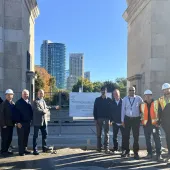Robots assemble rebar for Gotthard tunnel and beyond
A Swiss robotics start-up is transforming concrete reinforcement with automated systems capable of shaping, placing, and welding rebar – reducing labour needs and unlocking new design possibilities for construction projects ranging from major tunnels to architectural showpieces.
MESH, a spin-off from ETH Zurich, has developed robotic technology that streamlines the assembly of reinforcement cages, enabling complex geometries and large-scale prefabrication. The system, already in use for the second Gotthard road tunnel, allows engineers to fabricate up to 10,000 reinforcement cages with speed and consistency – reducing physical labour and improving quality control.
Based in a former industrial hall in Birr, Aargau, MESH combines automation expertise with architectural insight. Co-founder Ammar Mirjan, a trained automation engineer and architect, worked with ETH’s Gramazio Kohler Research to develop the technology through multiple academic and industry partnerships.
At the heart of the system is software that converts 3D design data into machine-readable instructions, allowing robotic arms to bend, position and weld rebar into intricate forms. These digital fabrication methods support both high-end architectural projects and the standardisation of precast elements in infrastructure.
Concrete innovation in action
MESH's most high-profile applications to date include the 3D-printed Tor Alva pavilion in Mulegns, Switzerland, and a digital construction installation at the Venice Architecture Biennale, where floating rings of rebar surround a humanoid robot in an exhibit titled A Robot’s Dream. These showcase the system’s ability to handle free-form structures and promote material-efficient construction through optimised geometries.
But the start-up is also making its mark in mainstream construction. By automating repetitive rebar tasks like sorting and stacking after stirrup bending – a job traditionally done by hand – MESH addresses skills shortages and reduces physical strain for workers. The company’s robotic systems are now being rented to rebar manufacturers across Switzerland.
Practical benefits for concrete contractors
For concrete producers and contractors, MESH's automation offers several benefits:
- Labour savings: Robots take on time-consuming, repetitive jobs, helping offset shortages in skilled site labour.
- Precision and consistency: Each reinforcement cage is produced with accurate tolerances, supporting quality assurance.
- Design flexibility: The system enables new architectural forms without increased labour costs.
- Prefabrication potential: Automated rebar assembly supports just-in-time manufacturing for precast concrete elements.
As concrete construction moves toward greater digitisation and offsite delivery, solutions like MESH point to a future where reinforcement can be tailored to each design without sacrificing cost or buildability.
“No two buildings are the same – even stairs often need unique rebar,” says Mirjan. “Digital automation helps maintain this diversity as the industry evolves.”










